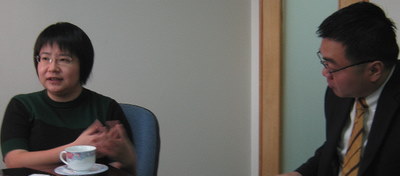
Inspur CFO Ivy Chan (left), and Mark Lee of Aries Consulting. Photo by Andrew van Buren
SOFTWARE OUTSOURCING firm Inspur International Ltd (HK: 596) saw its first half net profit rise by 25%, thanks in large part to Enterprise Resources Planning (ERP) and Operation Support Systems (OSS) software sales to major state-owned enterprises (SOEs) in China.
Gross margins for OSS software sales to customers like China Mobile and China Unicom, ERP sales to SOEs including Petrochina and Sinopec, and tax industry IT service sales such as Automatic Tax Return Machines (ARM) ranged between 35-45%.
Overall gross margins improved to 27.1% compared with 26.7% a year earlier.
Therefore, Inspur’s near-term future would focus on developing these OSS, ERP and ARM sales due to their very impressive returns, especially to SOE clients.
It is also stepping up its presence in the still nascent e-government software market in China, which is currently estimated to be worth over 70 bln yuan.
"The e-government market is still in a very initial stage. Inspur works with Microsoft on the Co-developed Government Administration and Approval Platform (ECGAP) in China. We have also secured contracts in 54 (out of 340) large cities across the country, and we aim to cover over 100 cities by the end of 2010,” said Inspur CFO and Company Secretary Ivy Chan.
In a recent meeting with NextInsight, Aries Consulting and fund managers from around Greater China, she said another long-standing and lucrative contract Inspur enjoyed was with China’s Taxation Bureau.
"We sell the Bureau a lot of software.”
Roots in hardware, future in software
Ms. Chan said the company has seen the industry from many vantage points.
Starting as a computer components manufacturer and trader in 1983, it gradually saw the light of higher margins on value-added software-as-a-service operations.
Starting from its Hong Kong GEM Board listing in 2004 and a strategic alliance with Microsoft that same year, Inspur has never looked back and has since then been a software-focused enterprise – notably following Microsoft’s 25 mln usd investment in 2005 to develop Inspur’s software outsourcing services.
"That financial support was a huge lift for us. We use Microsoft software for all our applications so we have good relations with them,” she said.
| |||||||||||||||||||||||||
Inspur is currently one of the top three ERP providers in China, and the fastest growing ERP firm in the country for the past six years.
It also enjoyed a 45% market share for ERP services provided to a somewhat unique client: China’s military.
China’s two largest and best-known telecom equipment makers ZTE and Huawei were key partners when looking to set up landlines, mobile systems and Internet connectivity in emerging markets.
"We hope to work together with ZTE and Huawei to develop new markets. Also, we hope to localize our systems in Latin America because governments there have relatively strict forex transfer restrictions and capital repatriation rules,” Ms. Chan said.
However, Inspur did not have as much at risk come bill collection time as it had a smaller stake in projects overseas than its two telecom infrastructure partners.
"As for client funding in these emerging markets, we don’t as yet have massive high volume sales in these markets so we don’t face the same financing problems that ZTE or Huawei might face.”
As for Inspur’s own financing needs, Ms. Chan said that the firm “usually has at least one placement or other fund-raising activity per year.”
Due to the nature of software-as-a-service, it was important to build a strong reputation for quality and integrity in the sector, because it was not one that allowed salespersons to easily display the efficacy and supremacy of their wares during sales calls or public tender gatherings.
"For us reputation is key as we can't physically or via photos show you our products. So we need to build trust and confidence in our software and IT service products,” Ms. Chan said.
She explained that Chinese SOEs and their growing demand for ERP and OSS software outsourcing needs were proving to be a virtual bonanza for Inspur.
"Chinese SOE’s are big clients of ours, and most of our revenue is derived from them. We also have stable revenue streams as half of our orders are from long-standing clients. It’s better to have these types of clients because they are very reliable.”
It wasn’t just Latin American telecom and IT grids that needed software outsourcing, but certainly domestic as well, as China has the world’s most handset subscribers and online computer users.

3G gets the green light: China now has over 700 mln handset subscribers, well over double the total US population, and cellular towers like this are ubiquitous across the country. Inspur is well-positioned to provide software services to major domestic telecom firms. Internet photo
"For our OSS systems, we mainly sell them to telecom firms, and in China, all of our telecom clients are SOEs. The China 3G network will be launched in 2008, which represents a new peak of investment into OSS with a business of four bln yuan. Ranked third in the OSS sector in 2006, we now have a market share of 19.04%. The launch of 3G services will definitely provide us vast room for development."
She said a “non-traditional” SOE of a different sort was becoming an increasingly important client of Inspur’s.
Inspur is a “core contributor” in drafting industry standards for the tax-collection and tax-rebate sector, and the company was appointed the exclusive supplier of tax-control facilities for the 2008 Olympic Games.
"We successfully developed the only Automatic Tax Return Machine (ARM) in China last year. In the first half this year, we conducted trial runs in six provincial and municipal tax departments including Shanghai and Shandong.”
Transportation hubs were coming onto Inspur’s radar screen ever more prominently.
"Domestic air terminals are big clients, especially for our OSS systems.”
Inspur was also benefitting from regional rivalries and bragging rights between China’s two largest cities, and also saw an upside to bureaucratic traditions in the country.
"The municipalities of Beijing and Shanghai are big government clients of ours because they compete with each other for supremacy. Also, Chinese governments have many strata of bureaucracy and overlap, so this further drives their demand for our organizational software.”
And although the government was becoming an increasingly critical client, it also represented one of the biggest potential concerns on the policy side, as China’s telecom industry undergoes seachange regulatory transformation as the sector continues to see exponential expansion.
"In China, our main concern and potential hurdle is new government regulations and policies, because our biggest clients are SOEs and the government itself,” she said.
But potentially disadvantageous legislation down the road did not cause Inspur to lose its central focus.
"At the end of the day, we always keep our eyes on our clients’ needs, not industry regulatory trends.”
China may be the leading computer components factory of the world, but another Asian neighbor was much stronger in the field of software. But Inspur did not anticipate any feelings of wanderlust in the near term … at least on the production side of things.
"We have no plans to outsource to India because it’s still cost competitive in China,” she said.

